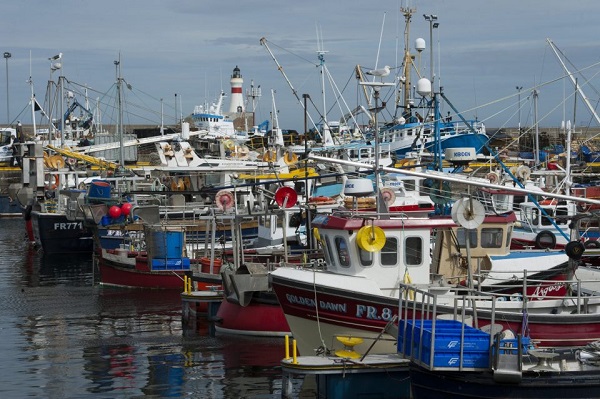
56 vessels grounded under Ghana's new IUU fishing measures - Hawa Koomson
Out of the 76 fishing vessels in Ghana, only 19 are currently on the seas fishing.
The remaining 56 vessels have not been cleared to go fishing due to non-compliance with the new fishing gear regime by the Ministry of Fisheries and Aquaculture Development (MoFAD).
Advertisement
The new fisheries management measures which have been introduced by the Ministry to prevent Illegal, Unreported and Unregulated (IUU) fishing on Ghanaian waters, forbids any vessel with unauthorised fishing gear (fishing nets) to fish on Ghanaian waters.
The Minister in charge of MoFAD, Mavis Hawa Koomson, in an interview with Graphic Online on Friday, January 13, 2023, said the Ministry was poised to weed out all forms of IUU fishing on Ghanaian waters.
She said the Ministry was not leaving any stone unturned in its efforts to comply with internationally accepted sustainable fishing practices.
She explained that the lack of proper fishing gears such as fishing nets was a major contributor to IUU fishing all over the world and that Ghana was no exception, hence the decision of the Ministry to start the IUU fight from the fishing gear.
Madam Hawa Koomson said the Ministry together with its agencies and departments had started a new and strict inspection efforts at the ports, all aimed at ensuring that all fishing vessels on Ghanaian waters have the right type of gears before they are cleared to fish.
She said the Ministry would not relax its efforts to flush out non-complying fishing vessels on Ghanaian waters.
Additionally, the Fisheries Minister cautioned that the Ministry would not hesitate to hand hefty punishment as prescribed in the Ghanaian fisheries laws, on any of the 19 vessels currently fishing on Ghanaian waters should they engage in any form of IUU fishing.
She was of the view that IUU fishing was denying the country of its needed revenues as well as contributing to the depletion of the country’s fish stocks.
For Madam Hawa Koomson, the Ministry of Fisheries and Aquaculture Development would not sit aloof for some selfish individuals to plunge the country’s fisheries sector into chaos through IUU fishing.
“We have given them very specific gears that they should use for fishing,” she noted.
The Minister also explained that the Ghana Maritime Authority had directed all fishing vessels to refurbish their vessels to ensure that they were safe for use.
Madam Hawa Koomson said the Ministry would not compromise on the safety of fishers on any vessels fishing on Ghanaian waters, stressing that any vessel that would fail to comply with the safety measures would not be allowed to fish on Ghanaian waters.
Additionally, she noted, to prevent illegal trans-shipment at sea, the Ministry had cancelled its 15 per cent allowable bycatch by the industrial fishing vessels.
She said no fishing vessels should have any bycatch at all and that all the 19 vessels currently at sea on Ghanaian waters were complying with the new directive.
“We do inspection before their departure and when they come, we also go to inspect what they brought,” Madam Hawa Koomson pointed out.
Also, speaking at the just ended 14th session of the Fisheries Committee for the West Central Gulf of Guinea (FCWC) in Accra on Friday, January 13, 2023, the Fisheries Minister pledged the commitment of Ghana to work with other coastal countries in the ECOWAS region to fight IUU.
Background
Ghana was on June 2, 2021 issued with a Yellow Card by the European Union (EU). This is because Ghana was identified by the EU as a non-cooperating third party state in fighting Illegal, Unreported and Unregulated fishing (IUU).
Ghana first received a Yellow Card in 2013 and was lifted in 2015 when the country introduced some reforms in the fisheries sector to tackle the menace.
However, the issues raised by the EU for the second Yellow Card included inadequacies in the area of legal framework to fight IUU; illegal trans-shipment at sea of large quantities of undersized juvenile pelagic species between industrial trawl vessels and canoes on Ghanaian waters; expired Marine Fisheries Management Plan (2015-2019); expired National Plan of Action to prevent, deter and eliminate IUU (NPOA-IUU)-2014-2018; deficiencies in the monitoring, control and surveillance of the fleet; as well as lack of deterrent sanctions imposed on vessels engaging in or supporting IUU fishing activities on Ghanaian waters.
Yellow Card
The Yellow Card is an official warning issued by the EU to trading partners falling short of tackling IUU fishing.
The Yellow Card is a warning and offers Ghana the opportunity to react and take measures to rectify the situation within a reasonable time. At this stage, the decision does not entail any measures affecting trade.
However, in cases of prolonged and continued non-compliance, countries can ultimately face a procedure of identification (a so-called red card), which entails sanctions such as the prohibition to export their fishery products to the EU market.
The Yellow Card starts a formal dialogue in which the Commission and the country issued with the warning work together to solve all issues of concern.
Coming out of the Yellow Card
Madam Hawa Koomson was hopeful that considering the new measures Ghana was putting in place, the country would soon come out of the Yellow Card.
She said Ghana would continue to comply with internationally accepted sustainable fishing measures and also work with its trade partners such as the European Union, to ensure that the country was free from IUU fishing.



